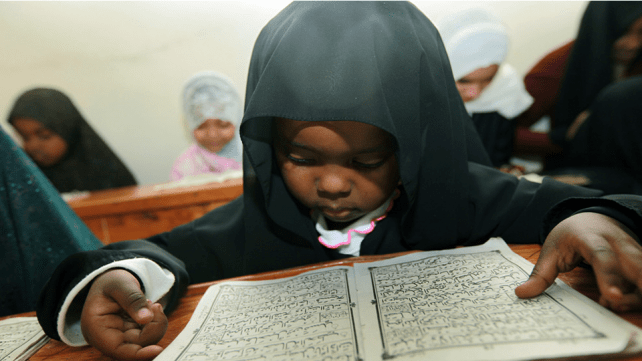Service-Learning in an Islamic Environment

By Malik Shaw
Why Service-Learning?
Service Learning is a form of education in which students engage in activities that address human and community needs with structured opportunities intentionally designed to promote student learning and development. Service learning allows students to go into their communities and apply the concepts they have learned in Science, Language Arts, Math, or Economics as well as put them into action. This application of knowledge is key to comprehending the subject at hand.
Service learning as a concept is as old as apprenticeships. Apprenticeships could be called the oldest and most effective form of teaching in history because the teacher taught the students and allowed them to practice the skills whether it is in carpentry, steelwork, or cobble making. Today we call these opportunities internships. Even in education before you can become a certified teacher you have to complete a semester of student-teaching where they apply what you learned to real-life situations and most teachers will testify that they learned more student teaching than they did during 2 or 4 years of coursework.
Goals of Service-Learning
- To encourage all students to test their academic knowledge in real-life situations by using the community as a classroom.
- To create an atmosphere where community service is not only an extracurricular activity but also a component to a student’s intellectual and personal development.
- To create a students presence in the community.
- To increase self-esteem in the students.
- To promote team building among the participants.
In relation to the first goal, when students see that their knowledge base is sound through their own application of it, they begin to build a trust in their teachers as well as in the knowledge. The goal of education is to get students to the level of being critical thinkers. An example of this is a program in the state of Montana where students in middle school and high school were educated in water management and water quality parameters and assessment. They were then allowed to put their knowledge into practice by completing a project called Project Clean Stream Teams, where students removed garbage along frequently used streams. This project attracted press coverage for students with diverse backgrounds. The students received recognition, certificates, and the opportunity to reflect on their work.
The second goal is creating an atmosphere where community service plays an integral role in education. Here are some reflections by students from Perry Meridian High School located in Indianapolis, IN, where students participate in many service-learning projects.
- “I can use what I know to help someone else. I feel it has made me a better person and helped me realize I can make a difference.” Melissa Meyer
- “Service-learning has shown me that you can learn important aspects of life outside of school.” Nick Jackson
The third goal of service-learning is to create a student presence in the community. It is no secret that schools that have high parental involvement and community support perform better than schools that lack these things. The community ties are strengthened when students seek out the needs of their communities and work to address the issues facing the community. Adults become familiar with students, making neighborhoods stronger because familiarity leads to comfort and a common goal of making the community better. Improving the community can be the first step towards making the country and then the world a better place for everyone. Parents and community members can work with students to achieve these goals.
The fourth and fifth goals are to increase the self-esteem of students and to promote team building. It is human nature to desire to be part of something, especially in the pre-teen and teenage years. This is why young people cherish their friendships and feel the great weight of peer pressure. You can also see this at the university level with the saturation of fraternities, sororities, and various student associations. Service-learning can create that group atmosphere in a positive way and encourage youth to learn how to work with others to solve problems.
Purpose of Islamic Studies
One of the purposes of Islamic studies is to teach and generate an understanding of the guidelines and traditions of Islam. We desire that our students become knowledgeable and develop a love for the Prophet Muhammad, peace and blessings of Allah be upon him. As teachers and parents, we desire that our own students get their dignity and self-esteem from practicing Islam. Islam is clear about right and wrong and we are commanded to be of those who do good things and benefit humanity.
Service-Learning and Islamic Studies
Aisha was once asked to describe the Prophet, peace be upon him, and she replied that he was “the walking Quran”, meaning that his behavior was the Quran translated into action. He applied the Book of Allah to real-life situations. This is what we should desire for ourselves and our children – to make the Book of Allah and the Sunnah of the Prophet (saas) a natural part of our daily lives. This is what service-learning does in regards to academic subjects. Service-learning allows the students to apply the knowledge of a particular subject to real-life situations. There are many ways in which service-learning can also be applied to Islamic Studies. In this paper, we will examine some ideas that can implemented immediately and some that would take more time to develop.
One of the most important aspects of the Prophet’s life is the importance of taking care of the poor and the needy. Allah reiterates this idea in Surah Al-Ma’oon verses 1-7:
See you one who denies the Judgment (to come)?
Then such is the one who repulses the orphan,
And encourages not the feeding of the indigent.
So woe to the worshippers,
Who are neglectful of their Prayers,
Those who (want but) to be seen,
But refuse (to supply) (even) neighbourly needs.
Service-Learning Projects in Islamic Schools
Students at all levels of education can participate in service-learning. Elementary students could help work on a food drive that would benefit a local shelter to food bank as part of their Islamic Studies curriculum. The students can create signs promoting the event and decorate boxes that would hold the food being collected. Older students can volunteer their time at homeless shelters, serving food or just talking to people.
At my own school, Arizona Cultural Academy (ACA), a full-time Islamic School in Phoenix, AZ, our middle and high school students organized and hosted a party for small children who lived in a local homeless shelter. Using the drama techniques they learned in Language Arts, they produced a play tailored to the young kids. They also did some face painting along with other fun activities that helped these small children forget about their situations for a little while. Our students became attached to these small children and were deeply touched by the gratitude they showed. As one of them noted in a reflective journal, “On Saturday we all went to a homeless shelter where all these little kids lived. We threw them a party and gave them prizes and gifts. You should have seen the look on their faces. They were so happy, I was going to burst into tears, but I just swallowed them. I’ve never seen kids that happy….”
Another way to create a strong empathy for the poor is to assist some of the refugees that come to the United States. Many of these refugees some with nothing more than the clothes on their backs. We must begin to help them by focusing and acting up on the many Ayah in the Qur’an and hadith that talk about helping the poor and needy.
A school garden is another way to teach Islamic values. Many of today’s youth will never experience the miracle of gardening because we live in places where food is extremely accessible through supermarkets. This activity requires knowledge of Science, hard work, patience, and trust in Allah. The miracle of food is addressed in Surah ‘Abasa verses 24-32:
Then let man look at his food, (and how We provide it):
For that We pour forth water in abundance,
And we split the earth in fragments,
And produce therein grain,
And grapes and the fresh vegetation,
And Olives and Dates,
And enclosed gardens, dense with lofty trees,
And fruits and fodder
A provision for you and your cattle.
It is also addressed in Surah Al-An’aam verse 99:
It is He Who sendeth down rain from the skies: with it We produce vegetation of all kinds: from some We produce green (crops), out of which We produce, close-compounded grains out of the date-palm and its sheath (or spathes) (come) clusters of dates hanging low and near: and (then there are) gardens of grapes and pomegranates, each similar (in kind) yet different (in variety): when they begin to bear fruit, feast your eyes with the fruit and ripeness thereof. Behold! In these things are Signs for people who believe.
Another easy-to-implement service-learning project addresses the rights of the neighbor. The Prophet Muhammad, peace be upon him, said, “Whosoever believes in Allah and the last day should treat his neighbor kindly.” (Muslim) We must instill in our students the necessity of treating the neighbors of our schools kindly by visiting them and taking to them gifts. This could remove some of the animosity they may have in their hearts towards Muslims because they may never have met a Muslim before. This also gives our students the opportunity to internalize a major aspect of Islam and allow them to represent the best of their religion. This will build their self-esteem like only Islam can.
Some other service-learning projects require more planning. Students could contact local nursing homes and hospitals about volunteering to visit the sick and the elderly. Camping trips for students can be planned since many students live in cities and suburbs where they cannot fully appreciate Allah’s Creations in a natural setting. On the campouts, students can witness the beauty of the stars and see how important and miraculous the ability to create fire is, they will appreciate the Blessings Allah Bestows on us daily. There will be no TV’s or radios around to distract them from this reflection. Students could also visit farms, where the Greatness and Wisdom and Allah are also displayed. Milking a cow may help the students gain a better understanding of Surah An-Nahl verse 66:
And most surely there is a lesson for you in the cattle; We give you to drink of what is in their bellies – from betwixt, the feces and the blood – pure milk, easy and agreeable to swallow for those who drink.
Students could also organize night of appreciation where they plan a program, including food and gifts, to show honor and respect to their parents, a major commandment in Islam. Working with Habitat for Humanity in the building of houses will help them realize the great things the children of Adam (AS) can achieve with the physical gifts Allah has Given us.
Benefits of Service-Learning
The benefits of teaching Islamic Studies with a service-learning format are numerous. Your school will be a haven of good deeds so, Insha Allah, the school as a whole will be rewarded. Students will also have the opportunity to serve humanity and reflect on the power and responsibility of that service. Connecting our Muslim youth with their communities helps enhance dawah efforts and acceptance of Muslims as good people in the wider society. You help shape young people who will continue to strive to make the world better for all. You enhance cross-curriculum work that incorporates Math, Language, Arts, and Science in projects. Finally, Islamic schools and Islamic Studies will become fun, interesting, and hands-on.
Summary
Service-learning as a teaching method will enhance the message of the subject matter while building the self-esteem and iman of our Muslim youth. Instead of mimicking the dominant youth culture, we must give our youth the tools and opportunities to love Islam and feel good about their lives as Muslims, following the footsteps of the Prophet Muhammad, peace be upon him.
Volunteer Organizations and Opportunities
- Local Volunteer Centers
- Red Cross
- United Way
- Habitat for Humanity
- Local Senior Citizens Centers
- Children’s Hospitals
- 4H Club – Agriculture and Gardening
- March of Dimes – Diabetes Awareness
- St. Jude Children’s Hospital – Cancer Research and Treatment
- Homeless Shelters and Soup Kitchens
- Neighbors – Those Close To Your Homes And Schools
This paper was presented by Br. Malik Shaw at the ISNA Education Forum in March 2005.


